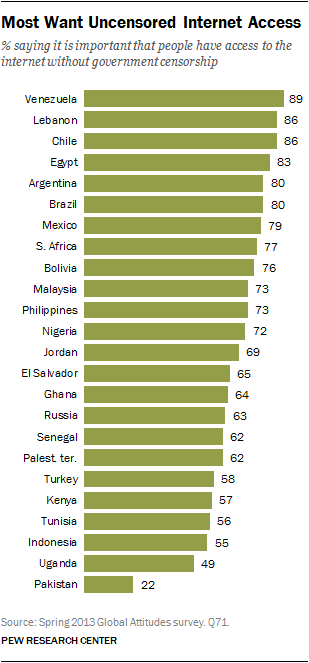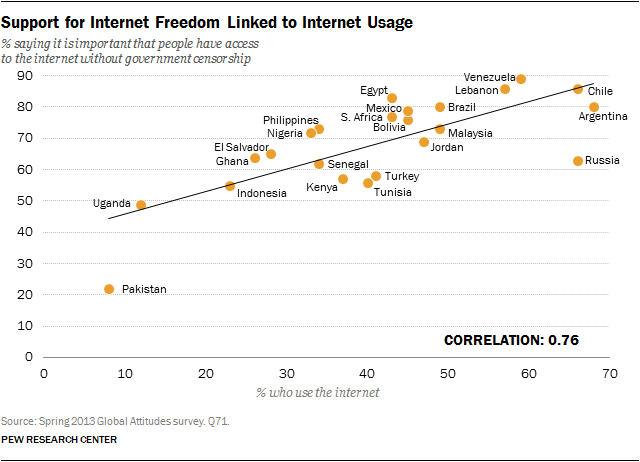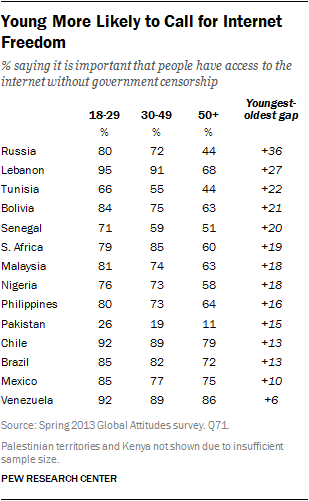Survey Methods
Results for the survey are based on face-to-face interviews conducted under the direction of Princeton Survey Research Associates International. Survey results are based on national samples. For further details on sample designs, see below.
The descriptions below show the margin of sampling error based on all interviews conducted in that country. For results based on the full sample in a given country, one can say with 95% confidence that the error attributable to sampling and other random effects is plus or minus the margin of error. In addition to sampling error, one should bear in mind that question wording and practical difficulties in conducting surveys can introduce error or bias into the findings of opinion polls.
| Country: | Argentina |
| Sample design: | Multi-stage cluster sample stratified by locality size |
| Mode: | Face-to-face adults 18 plus |
| Languages: | Spanish |
| Fieldwork dates: | March 6 – March 26, 2013 |
| Sample size: | 819 |
| Margin of Error: | +/-4.7 percentage points |
| Representative: | Adult population (excluding dispersed rural population, or 8.8% of the population) |
| Country: | Bolivia |
| Sample design: | Multi-stage cluster sample stratified by department and urbanity |
| Mode: | Face-to-face adults 18 plus |
| Languages: | Spanish |
| Fieldwork dates: | March 12 – April 18, 2013 |
| Sample size: | 800 |
| Margin of Error: | +/-4.5 percentage points |
| Representative: | Adult population (excluding dispersed rural population, or 10% of the population) |
| Country: | Brazil |
| Sample design: | Multi-stage cluster sample stratified by Brazil’s five regions and size of municipality |
| Mode: | Face-to-face adults 18 plus |
| Languages: | Portuguese |
| Fieldwork dates: | March 4 – April 21, 2013 |
| Sample size: | 960 |
| Margin of Error: | +/-4.1 percentage points |
| Representative: | Adult population |
| Country: | Chile |
| Sample design: | Multi-stage cluster sample stratified by region and urbanity |
| Mode: | Face-to-face adults 18 plus |
| Languages: | Spanish |
| Fieldwork dates: | March 4 – March 19, 2013 |
| Sample size: | 800 |
| Margin of Error: | +/-5.2 percentage points |
| Representative: | Adult population (excluding Chiloe and other islands, or 3% of the population) |
| Country: | Egypt |
| Sample design: | Multi-stage cluster sample stratified by governorates and urbanity |
| Mode: | Face-to-face adults 18 plus |
| Languages: | Arabic |
| Fieldwork dates: | March 3 – March 23, 2013 |
| Sample size: | 1,000 |
| Margin of Error: | +/-4.3 percentage points |
| Representative: | Adult population (excluding Frontier governorates, or about 2% of the population) |
| Country: | El Salvador |
| Sample design: | Multi-stage cluster sample stratified by department and urbanity |
| Mode: | Face-to-face adults 18 plus |
| Languages: | Spanish |
| Fieldwork dates: | April 18 – May 1, 2013 |
| Sample size: | 792 |
| Margin of Error: | +/-5.3 percentage points |
| Representative: | Adult population |
| Country: | Ghana |
| Sample design: | Multi-stage cluster sample stratified by region and settlement size |
| Mode: | Face-to-face adults 18 plus |
| Languages: | Akan (Twi), English, Dagbani, Ewe |
| Fieldwork dates: | March 20 – April 3, 2013 |
| Sample size: | 799 |
| Margin of Error: | +/-4.7 percentage points |
| Representative: | Adult population |
| Country: | Indonesia |
| Sample design: | Multi-stage cluster sample stratified by province and urbanity |
| Mode: | Face-to-face adults 18 plus |
| Languages: | Bahasa Indonesian |
| Fieldwork dates: | March 9 – March 27, 2013 |
| Sample size: | 1,000 |
| Margin of Error: | +/-4.0 percentage points |
| Representative: | Adult population (excluding Papua and remote areas or provinces with small populations, or 12% of the population) |
| Country: | Jordan |
| Sample design: | Multi-stage cluster sample stratified by Jordan’s 12 governorates and urbanity |
| Mode: | Face-to-face adults 18 plus |
| Languages: | Arabic |
| Fieldwork dates: | March 4 – March 23, 2013 |
| Sample size: | 1,000 |
| Margin of Error: | +/-4.5 percentage points |
| Representative: | Adult population |
| Country: | Kenya |
| Sample design: | Multi-stage cluster sample stratified by province and settlement size |
| Mode: | Face-to-face adults 18 plus |
| Languages: | Kiswahili, English |
| Fieldwork dates: | March 13 – March 30, 2013 |
| Sample size: | 798 |
| Margin of Error: | +/-4.3 percentage points |
| Representative: | Adult population |
| Country: | Lebanon |
| Sample design: | Multi-stage cluster sample stratified by Lebanon’s seven regions and urbanity |
| Mode: | Face-to-face adults 18 plus |
| Languages: | Arabic |
| Fieldwork dates: | March 4 – March 22, 2013 |
| Sample size: | 1,000 |
| Margin of Error: | +/-4.0 percentage points |
| Representative: | Adult population (excluding a small area in Beirut controlled by a militia group and a few villages in the south of Lebanon, which border Israel and are inaccessible to outsiders, or about 2% of the population) |
| Country: | Malaysia |
| Sample design: | Multi-stage cluster sample stratified by state and urbanity |
| Mode: | Face-to-face adults 18 plus |
| Languages: | Malay, Mandarin Chinese, English |
| Fieldwork dates: | March 4 – April 3, 2013 |
| Sample size: | 822 |
| Margin of Error: | +/-4.3 percentage points |
| Representative: | Adult population (excluding difficult to access areas in Sabah and Sarawak, or about 7% of the population) |
| Country: | Mexico |
| Sample design: | Multi-stage cluster sample stratified by region and urbanity |
| Mode: | Face-to-face adults 18 plus |
| Languages: | Spanish |
| Fieldwork dates: | March 4 – March 17, 2013 |
| Sample size: | 1,000 |
| Margin of Error: | +/-4.1 percentage points |
| Representative: | Adult population |
| Country: | Nigeria |
| Sample design: | Multi-stage cluster sample stratified by region and urbanity |
| Mode: | Face-to-face adults 18 plus |
| Languages: | English, Hausa, Yoruba, Igbo |
| Fieldwork dates: | March 6 – April 4, 2013 |
| Sample size: | 1,031 |
| Margin of Error: | +/-4.0 percentage points |
| Representative: | Adult population (excluding Borno, Yobe and some areas in Taraba, or about 5% of the population) |
| Country: | Pakistan |
| Sample design: | Multi-stage cluster sample stratified by province and urbanity |
| Mode: | Face-to-face adults 18 plus |
| Languages: | Urdu, Pashto, Punjabi, Saraiki, Sindhi |
| Fieldwork dates: | March 11 – March 31, 2013 |
| Sample size: | 1,201 |
| Margin of Error: | +/-4.3 percentage points |
| Representative: | Adult population (excluding the Federally Administered Tribal Areas, Gilgit-Baltistan, Azad Jammu and Kashmir for security reasons as well as areas of instability in Khyber Pakhtunkhwa [formerly the North-West Frontier Province] and Baluchistan, or roughly 18% of the population). Disproportionately urban. The data were weighted to reflect the actual urbanity distribution in Pakistan. |
| Country: | Palestinian territories |
| Sample design: | Multi-stage cluster sample stratified by region and urban/rural/refugee camp population |
| Mode: | Face-to-face adults 18 plus |
| Languages: | Arabic |
| Fieldwork dates: | March 29 – April 7, 2013 |
| Sample size: | 810 |
| Margin of Error: | +/-4.4 percentage points |
| Representative: | Adult population (excluding Bedouins who regularly change residence and some communities near Israeli settlements where military restrictions make access difficult, or roughly 5% of the population) |
| Country: | Philippines |
| Sample design: | Multi-stage cluster sample stratified by region and urbanity |
| Mode: | Face-to-face adults 18 plus |
| Languages: | Tagalog, Cebuano, Ilonggo, Ilocano, Bicolano |
| Fieldwork dates: | March 10 – April 3, 2013 |
| Sample size: | 804 |
| Margin of Error: | +/-4.5 percentage points |
| Representative: | Adult population |
| Country: | Russia |
| Sample design: | Multi-stage cluster sample stratified by Russia’s eight regions plus Moscow and St. Petersburg and urbanity |
| Mode: | Face-to-face adults 18 plus |
| Languages: | Russian |
| Fieldwork dates: | March 5 – March 21, 2013 |
| Sample size: | 996 |
| Margin of Error: | +/-3.6 percentage points |
| Representative: | Adult population (excluding High North regions, the Chechen Republic, and the Ingush Republic, or about 3% of the population) |
| Country: | Senegal |
| Sample design: | Multi-stage cluster sample stratified by region and urbanity |
| Mode: | Face-to-face adults 18 plus |
| Languages: | Wolof, French |
| Fieldwork dates: | March 6 – March 30, 2013 |
| Sample size: | 800 |
| Margin of Error: | +/-4.1 percentage points |
| Representative: | Adult population |
| Country: | South Africa |
| Sample design: | Multi-stage cluster sample stratified by metropolitan area, province and urbanity |
| Mode: | Face-to-face adults 18 plus |
| Languages: | English, Zulu, Xhosa, South Sotho, Afrikaans |
| Fieldwork dates: | March 18 – April 12, 2013 |
| Sample size: | 815 |
| Margin of Error: | +/-4.1 percentage points |
| Representative: | Adult population |
| Country: | Tunisia |
| Sample design: | Multi-stage cluster sample stratified by governorate and urbanity |
| Mode: | Face-to-face adults 18 plus |
| Languages: | Tunisian Arabic |
| Fieldwork dates: | March 4 – March 19, 2013 |
| Sample size: | 1,000 |
| Margin of Error: | +/-4.0 percentage points |
| Representative: | Adult population |
| Country: | Turkey |
| Sample design: | Multi-stage cluster sample stratified by the 26 regions (based on geographical location and level of development (NUTS 2)) and urbanity |
| Mode: | Face-to-face adults 18 plus |
| Languages: | Turkish |
| Fieldwork dates: | March 5 – March 24, 2013 |
| Sample size: | 1,000 |
| Margin of Error: | +/-7.7 percentage points |
| Representative: | Adult population |
| Country: | Uganda |
| Sample design: | Multi-stage cluster sample stratified by region and urbanity |
| Mode: | Face-to-face adults 18 plus |
| Languages: | Luganda, English, Runyankole/Rukiga, Luo, Runyoro/Rutoro, Ateso, Lugbara |
| Fieldwork dates: | March 15 – March 29, 2013 |
| Sample size: | 800 |
| Margin of Error: | +/-4.3 percentage points |
| Representative: | Adult population |
| Country: | Venezuela |
| Sample design: | Multi-stage cluster sample stratified by region and parish size |
| Mode: | Face-to-face adults 18 plus |
| Languages: | Spanish |
| Fieldwork dates: | March 15 – April 27, 2013 |
| Sample size: | 1,000 |
| Margin of Error: | +/-3.5 percentage points |
| Representative: | Adult population (excluding remote areas, or about 4% of population) |





